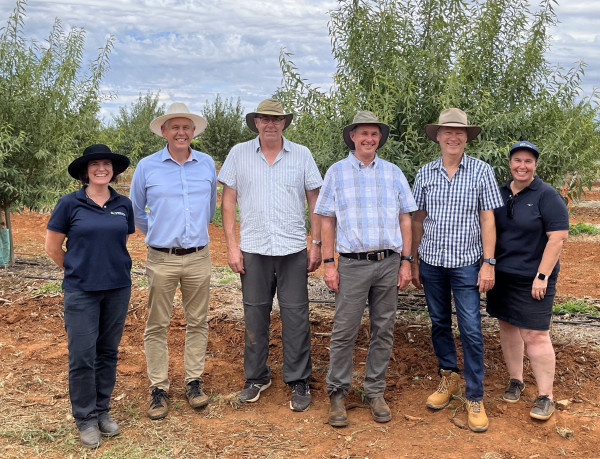PROGRAM leader Professor Paul Petrie and his team are working hard to revolutionise the long-term management of Sunraysia’s almond industry and from there, eventually, all Australia’s almond growers.
It’s just that he is doing it in slow motion. Patience, Prof Petrie says, is a virtue in the almond industry and most perennial horticultural crops, as they take at least three years from planting to the first commercial harvest.
The concept he is exploring is whole orchard recycling (WOR) – potentially a more environmentally friendly approach and a system which grew out of California’s severe clean air regulations, where they are unable to burn trees when the orchard reaches the end of its life.
“Almond orchards have a lifespan, after about 20 years the tree’s productivity starts to drop off, so the growers need to redevelop, maybe planting new varieties and replacing infrastructure,” Prof Petrie explains.
“Unfortunately, when an orchard reaches the end of its commercial life, this resource is traditionally managed through burning as part of the orchard redevelopment.”
“While burning is a quick and effective means to clear debris from the site and can reduce pathogen load, it also releases a significant amount of carbon that could potentially be sequestered or at least incorporated to improve soil organic matter, fertility and help with the establishment and productivity of the new orchard.
“Almond trees accumulate significant carbon during their lifecycle and the trial will explore the use of this resource as part of the orchard re-establishment.
“WOR looks at grinding the trees into chips and applying them as soil amelioration to the newly replanted almond orchard, with the long-term goals of less water; productivity benefits and an increase carbon sequestration,” he says.
“We are using about 3ha of Merbein producer Neale Bennett’s land for the project, and he has just planted a mix of Nonpareil with pollinators Pyrenees and Shasta, so at the moment we are monitoring tree establishment and growth, soil moisture, greenhouse gas release and soil carbon levels.”
The trial at the Bennett orchard aims to quantify the impact of whole orchard recycling on the carbon footprint of an almond orchard, including the impact on carbon storage and turnover in the soil, soil greenhouse gas emissions and the carbon accumulation by the newly planted trees.
It will also assess any co-benefits such as improved irrigation use efficiency and soil healthy and potential negative impacts such as increased pressure from soil pathogens and potential for nitrogen loss.
“As the original organic matter from the ground trees breaks down, it draws nitrogen out of the soil – this can impact on tree growth and establishment and needs to be managed carefully with judicious nitrogen applications,” Prof Petrie adds.
“The project is not quite two years old yet, and it will be at least another two before we are able to harvest any nuts, so we will not have any tangible yield results until the end of next year.
Almond Board of Australia chief executive Tim Jackson says the Bennett WOR trial will “add significant rigour to the benefits of whole orchard recycling in Australian conditions.
Mr Jackson says it will help with orchard redevelopment programs and help quantify expectations around carbon farming, changes in soil health, irrigation use efficiency and productivity improvements.
He says the recycling results on Californian soils have been widely embraced and are contributing to longer term aspirations for the industry to become at least carbon neutral.
“Almond growers are all about embracing the most sustainable practices available and this trial is yet another example of that commitment,” Mr Jackson added.
“The global expectation around improving the sustainability of how you do business is not lost on our industry.
“A commitment to firstly measuring the achievements across the industry so far and tackling areas of improvement is gathering momentum farm by farm, processor by processor.”
The ABA has been consulting widely across the industry and beyond regarding sustainability in order to develop tools to support, educate and guide stakeholders of all sizes who are committed to being part of the Australian sustainable almonds program.”
The Whole Orchard Recycling trial is managed by the South Australian Research and Development Institute, from its labs based in Loxton and Adelaide, and supported by Horticulture Innovation Australia.
You might also like to read:
Managing Nutrient Imbalance: Tips for growers using whole orchard recycling
















